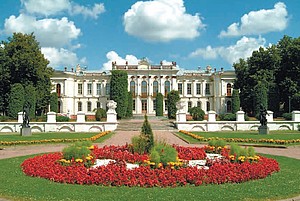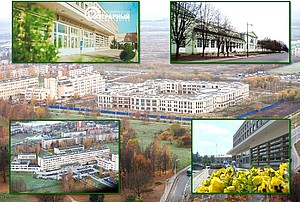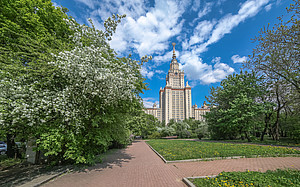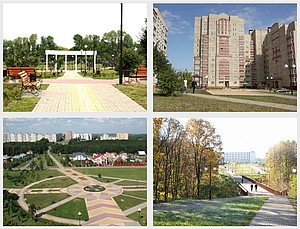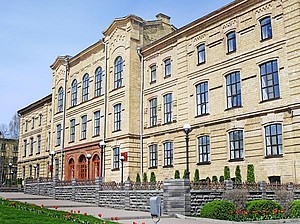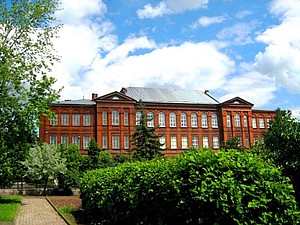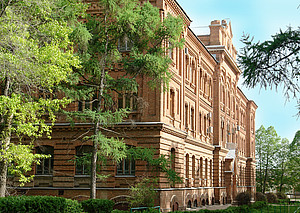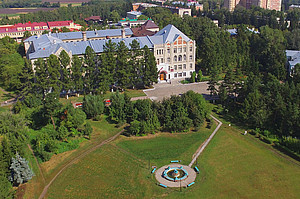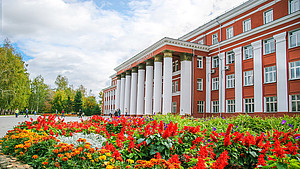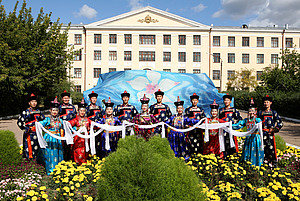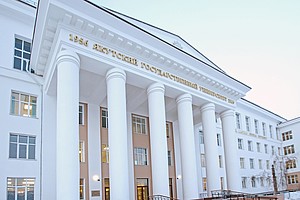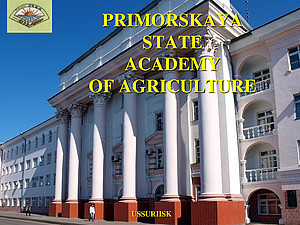Partner Universities in Russia
Co-coordinator: Russian State Agrarian University - Moscow Timiryazev Agricultural Academy
The Russian State Agrarian University - Moscow Timiryazev Agricultural Academy (RSAU-MTAA) is the oldest and the most well-known agrarian university in Russia. In 2015, it celebrated its 150th anniversary. 14 full-time faculties of the University offer courses in the broad field of agrarian science and agribusiness. The University implements three-level system of education: Bachelor's Degree course - 4 years, Master's Degree course - 2 years, Postgraduate course - 3 or 4 years. The range of the academic programs is constantly being enlarged and currently includes about 40 BSc degree programs, 27 MSc degree programs including three in English (Economics, Biotechnology and Ecology) and 53 PhD programs. These programs at BSc, MSc and PhD level are offered by 18 faculties. RSAU-MTAA is a member of prestigious international organizations and is engaged in student exchange and development of new curricula, double-degree programs, and the use of distance learning with universities from all over the world. It currently has over 16.000 students, over 750 of who are international. The University has 4 training and research farms located in different regions of Russia, a preventive clinic, laboratories, studios and other structural elements like the oldest meteorological station, field experimental station and 10 museums, among them a unique soil science museum and horse breeding museum.
St. Petersburg State Agrarian University
Saint-Petersburg State Agrarian University (SPSAU) has a unique location - the world-famous place - Tsarskoye Selo, a former Russian residence of the imperial family, included in the UNESCO list. The HEI originated from the first higher agricultural courses for women in Russia and celebrated its 100th anniversary in 2004. At current SPSAU is a large higher educational institution, which comprises three faculties (Crop Production, Livestock Production and Agricultural Economics and Politics), 6 institutes and a branch in the City of Kaliningrad. SPSAU has been well known in the world by researches worked at its platform: Stebut, Vavilov, Joffe, Lurie, Mendeleyev, and reserves this tradition up to the present day: 65,5% of the University academic staff are profound researches holding scientific degrees and statuses. More than 20 BSc degree programs, 15 MSc degree programs and 23 programs for doctoral studies are available for perspective students. Number of international incomings amounts up to 10% of total 4.729 students enrolled at the HEI.
Moscow State University
One of the oldest Russian institutions of higher education, Moscow State University (MSU) was established in 1755. In 1940 it was named after Academician Mikhail Lomonosov, an outstanding Russian scientist, who greatly contributed to the establishment of the university. According to Lomonosov's plan, there were originally three faculties: the Faculty of Philosophy, Law and Medicine. Now the MSU structure is the following: 42 faculties, 15 research institutions, 6 branches, 4 museums, Science Park, Botanic Gardens, Library System, Observatory and University schools. The result is a study offer that covers training in almost all branches of modern science and humanities. The HEI's undergraduates may choose out of 128 qualifications in its 42 faculties, while post-graduate students can specialize in 18 branches of science and humanities and in 168 different areas. 6 MSU Branches have been opened in differernt cities - Dushanbe, Erevan, Astana, Tashkent, Baku and Sevastopol. MSU has several country-oriented educational centers: French Educational College, Russian-German Institute, Japanise Center, Confucius Institute. Nowadays there are over 40.000 students and 10.000 academic and research employees at MSU, among them 7.500 international undergraduates and postgraduates from all over the world.
Belgorod State Agricultural University
The Belgorod State Agricultural University named after V. Gorin (Belgorod SAU) is the largest scientific educational center of Central Black Earth (Chernozem) Region. Established in 1956 as a scientific institution, the University has rapidly grown to the Academy and received a university status in 2014. Belgorod SAU has 7 faculties (Agronomy, Technology, Veterinary Medicine, Engineering, Economics, Extramural education and Post-secondary education) and graduating professionals in every single one of these areas. The HEI has recently introduced the innovative part-time MBA course "MBA-Agribusiness" taught in English and Russian by the team of international experts. There is a preparatory Russian Language Course for international students that has started 7 years ago and is still being offered at the University. Prospective students are also offered 20 BSc and 16 MSc degree programs. Graduates aiming to scientific career can take advantage of 14 PhD programs in Belgorod SAU. Experienced teaching staff consisting of 51 professors, 179 PhD teaching assistants and 324 senior teachers who provide deep and relevant education to overall of 8.300 students.
Stavropol State Agrarian University
Stavropol State Agrarian University is one of the leading Russian centers of higher education, culture and science, which is carrying out educational, scientific research, consulting and methodical activity located in the North Caucasus. The University was established in 1930. Nowadays there are 9 faculties (Agrobiology and Land Resources, Veterinary Medicine, Mechanical Engineering, Electrical Power Engineering, Technological Management, Ecology and Landscaping, Accounting and Finance, Economics, Hospitality and Tourism), 41 academic departments, 83 innovative laboratories and centers, a scientific library, an institute of additional professional education, 5 student dormitories, 2 sport complexes, a horse-riding school, 3 plant houses and 2 vivaria. Property of the university includes 119 objects of real estate with total area of 158.3 thousand m2, 18 land plots with total area of 9.609 ha as part of educational and experimental farm, which is equipped with modern agricultural machinery. About 15.500 enrolled students are currently taught in 104 higher education programs (undergraduate, graduate, specialties, post-graduate), including 90 international students. The university has 136 strategic partners in 66 countries. Since 2005 Stavropol SAU has been taking the top three places of the annual ranking among leading agricultural universities, organized by the Ministry of Agriculture of the Russian Federation.
Michurinsk State Agrarian University
Michurinsk State Agrarian University (Michurinsk SAU) used to be a Lawn-and-Garden Institute organized on the initiative of famous crop breeder Ivan V. Michurin in 1931. Nowadays the HEI is a scientific and educational center, keeping the leading position in the sphere of horticulture in Russia. The HEI is a center for vegetable growing technologies development and functional food elaboration in the region. Around 40.000 specialists in different branches of agriculture got professional higher education in Michurinsk SAU. There are 26 BSc degree programs, that are mostly continued on the Master level, and 36 post graduate courses, involving 123 post-graduate students working for a PhD degree, held in 4 institutes of Michurinsk SAU - Horticultural Institute, Institute of Law and Economics, Engineering Institute and Institute of Social Sciences and Pedagogics. Almost 7.000 students benefit from these programs, about 3% are foreign students from Asia, Africa and Eastern Europe. They are being taught by about 350 teaching staff members, including academicians of the Russian Academy of Agricultural Sciences, professors and associate professors.
Samara State Agricultural Academy
Stemmed from the settlement of the Rural School in Samara Governorate, Samara State Agricultural Academy (SSAA) is approaching its centenary in 2019. SSAA offers 16 BSc programs, 4 MSc programs and 16 PhD programs, orientated in forestry, agronomy, animal sciences, economics and other agricultural branches. Developing as a training and scientific institution in the agro-industrial complex of Volga Region of Russia, SSAA has integrated 5 faculties (Faculty of Agronomy, Faculty of Biotechnology and Veterinary Medicine, Engineering Faculty, Technological Faculty and Economic Faculty), 29 chairs, 6 specialized centers (including the Language Centre), a veterinary clinic and the Institute of management technology and agrarian market under its umbrella. Number of foreign students enrolled in SSAA has been rapidly growing. At present it amounts to 102 from 4.067 regular students. Focal area of SSAA international activities is adaption of multi-level training system and a focus on vocation-oriented training, uprising competitiveness of graduates on the global labor market.
Omsk State Agrarian University
The history of one of the oldest institutions of Russian Federation Omsk State Agrarian University (Omsk SAU) dates back to the first half of the 20th century. Founded in February 1918, Omsk SAU has been constantly growing and encompassing new branches of learning and research. Nowadays Omsk SAU is a fast-developing regional center delivering scientific provision of the agricultural industrial complex and education cultural services of Omsk region. It comprises 3 institutes (Institute of Economics and Finance, Institute of Veterinary Medicine and Biotechnology and Institute of Additional Professional Education), a Tara Town branch, Omsk Agrarian Training College and a Pre-University Training Center. Offering 36 BSc, 17 MSc and 29 PhD programs, Omsk SAU brings up sought-after specialists in the fields of agronomy, land management, economics, ecology, environmental engineering and water-use, veterinary medicine and others. The University is alma mater to approximately 9.000 students, 600 of whom are international. In 2016 Omsk SAU was listed in top 15 agricultural higher educational institutions ranking among 54 HEIs under the Ministry of Agriculture of Russia.
Novosibirsk State Agrarian University
Novosibirsk State Agrarian University (Novosibirsk SAU) is a big scientific and research centre and the leading agricultural institution of the region. It is focused on educating and training people in agribusiness sphere and professional retraining in agribusiness. Comprising 8 faculties specialized in agricultural, engineering, natural sciences and humanities, Novosibirsk SAU established 25 BSc programs, 15 MSc programs and 8 postgraduate programs at present. The University is aimed at developing scientific, educational and industrial complex by means of integration between science, education and business, providing commercialization of research results and establishing innovative SMEs. Almost 5000 full-time students are currently enrolled in Novosibirsk SAU. The number of international students enhanced to 343 in 2016. As a sustainably developing HEI, Novosibirsk SAU has created its own Testing Laboratory Complex consisting of 5 separate units: Microbiological Laboratory, Physical-chemical laboratory, Laboratory of entomoacariphage breeding, Laboratory of enzymic analysis and DNA technologies and Laboratory of phytosanitary monitoring and control.
Buryat State Academy of Agriculture, Ulan-Ude
The Buryat State Academy of Agriculture (BSAA) was founded in 1931. It is the first higher educational institution in Republic of Buryatia and one of the dynamically and successfully developing institutions in Siberia and Far East. For its 80 years history the BSAA gained a rich expertise and high scientific potential and follows the pattern of continuous intense development. The Academy is a multidisciplinary scientific, cultural and educational center with 6 faculties (faculty of agronomy, faculty of humanities, faculty of economics, faculty of veterinary medicine, faculty of technology and faculty of engineering) and 3 institutes (institute for language studies and cross-cultural communication, institute of land-management, cadaster and land-reclamation and institute for further vocational education). It trains specialists in 48 specialties offering 30 BSc programs, 17 MSc programs as well as 16 PhD programs. BSAA opened its doors for 153 international students among 4667 students enrolled in total. Besides, the Academy implements numerous secondary vocational trainings and programs of qualification upgrading and retraining, aspiring to educate highly-competent specialists with a strong commitment to cultural diversity and equality.
North-Eastern Federal University, Yakutsk
The Ammosov North-Eastern Federal University (NEFU) is one of the ten federal universities of the nation and is the largest HEIs in the Russian northeast. Today, NEFU with its four campuses in Anadyr, Nerungri, Mirny and Yakutsk is a strategic centre for the formation of a common cultural, scientific and educational space based on the values of indigenous culture of the northeast citizens of Russia. The HEI comprises 14 institutes, 6 faculties and 6 research institutes, covering the wide range of study fields from life sciences, mathematics, and medicine to philology, law, and history. 227 programs for undergraduates, 120 MSc and 95 PhD programs are annually opened for incomings for providing quality education in a multi-ethnic environment. NEFU launched 7 strategic academic units on ecology, biomedicine, economics, transport, social sciences and innovation and holds the Siberian Summer School in the surrounding of UNESCO's World Heritage Lena Pillars Natural Park. The number of regular students in NEFU is impressive. More than 18000 students, including 200 international, chose NEFU as their home university.
Primorskaya State Academy of Agriculture, Ussuriysk
Primorskaya State Academy of Agriculture (PSAA) was founded in 1957 and consists of five institutes. Land Management and Agrotechnologies Institute trains specialists in agronomy, technology of farm production and processing, agroecology, land management, re-cultivation and land protection. Animal Science and Veterinary Medicine Institute focuses on animal science, veterinary medicine, veterinary-sanitary expertise and specializes in technology of meat and milk processing, cynology, diseases of small, decorative and wild animals. Forestry Institute trains the specialists in forestry and biology. The Institute has strong teaching and laboratory facilities, incl. a forest area of about 29.000 ha. Engineering Institute trains specialists in farm engineering and mechanization of farm processes, engineer systems of water supply, irrigation and drainage. The Institute of Professional Retraining gives the possibility of receiving the second higher education and further professional education. At present about 3.200 full-time and more than 1.900 distance students are enrolled at PSAA. Annually the Academy holds international seminars, conferences and forums. Students have the possibility to practice and obtain skills at the partner universities in neighboring countries.

